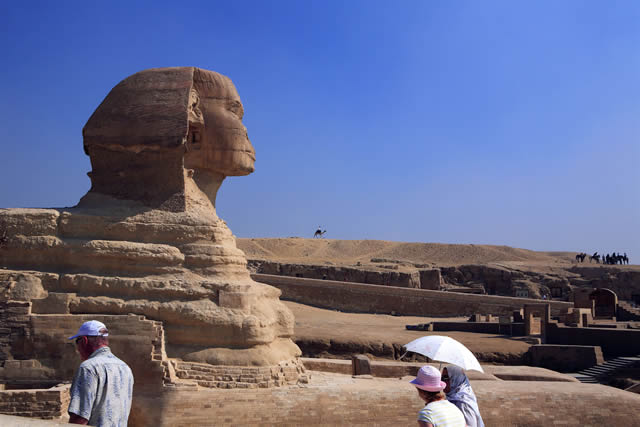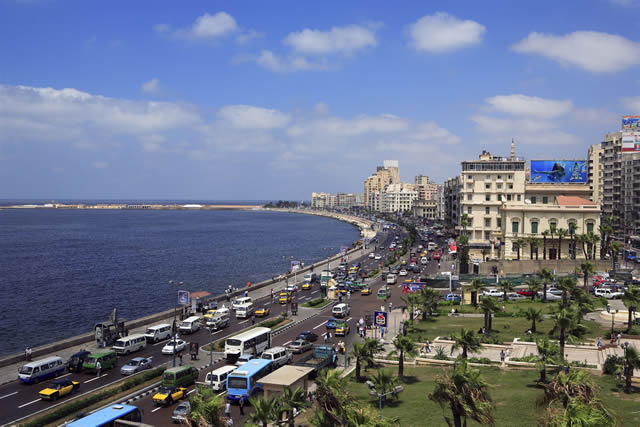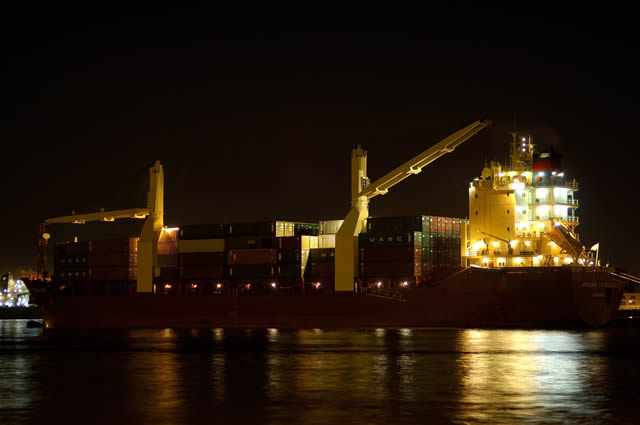[2014年9月号掲載記事]
Hisham EL-ZIMAITY,
Egyptian Ambassador to Japan
“I once asked someone why the Egyptian vegetable tussa jute or molokhia is so popular in Japan. She answered, ‘because Tussa jute contains umami, a taste Japanese are fond of.’ Egypt is a distant country from Japan, but there are some things we have in common,” smiles the ambassador Hisham EL-ZIMAITY.
The ambassador came to Japan in September 2011. “I soon got used to life in Japan,” he recalls. “I like to try out foods from different countries. Japanese dishes are all delicious. My big favorites are teppan-yaki (cuisine fried on a hotplate) and sushi. Kobe beef is also great,” he says. “The Japanese language is hard, though. I don’t have enough time for study, so unfortunately I still can’t speak it.”
The ambassador has visited many places in Japan including Nara, Kyoto, Osaka and Fukushima. “Wherever I go, I’m impressed with people’s self-discipline. In addition, Japanese people are capable of acting as a group. Such virtues were apparent at the time of the Great East Japan Earthquake and when the stadium (stands) were cleaned up by Japanese supporters after the World Cup soccer matches. I think Egyptians could learn something from this,” he says.
The ambassador has also been to Hiroshima and Nagasaki. “Those atomic bomb tragedies should never happen again,” he says with a sad face. “In Egypt, our Foreign Minister releases a statement every August 6 saying that it’s important never to use nuclear weapons again. We’d like to work alongside Japan in order to abolish nuclear, biological and chemical weapons,” he says.

The sphinx
“I also like the honest hardworking spirit of the Japanese,” says the ambassador. “And Japanese people don’t hesitate to venture out into the world to learn about other cultures. Japanese are among the world’s best violinists and pianists in classical music. This is also impressive.”
“Japanese and Egyptians have some things in common,” says the ambassador. “For example, we all cherish family values. I’ve heard that Japanese children often don’t leave their parents’ home until they are married. It’s the same in Egypt. When I go out to restaurants on weekends, I see young people who come to enjoy their time with their parents. I’ve also witnessed situations in which everyone listens respectfully once an older person starts talking. I think it’s just like that in Egypt.”
According to the ambassador, good hygiene is another thing Japanese and Egyptians have in common. “Cleanness is important for Muslims, so we wash before prayers five times a day. I’m under the impression that it’s important also for the Japanese.” He says they’re also alike in the way they incorporate different cultures into their own. “In Japan, people wear all kinds of fashions. Some, however, try to preserve traditions by wearing kimono.”
“In Egypt, more people wear Western clothes in urban areas, but in the countryside, people still dress traditionally,” says the ambassador. “People wear a garment called the jellabiya in the Nile Delta. On the Sinai Peninsula, their outfits resemble those worn by the Jordanian and Palestinian Bedouins. Western Egypt has a Libyan-influenced brownish costume. And in the very hot region of Nubia they wear white. I enjoy wearing something similar to the jellabiya on ceremonial occasions and suchlike.”

The sea front at Alexandria
With its numerous ancient sites, tourists flock to Egypt from all over the world. “Our country had the oldest kingdom in history,” says the ambassador. “Right now, the Great Egyptian Museum is being built near the Giza pyramids with help from Japan. When it’s completed, it’ll be a wonderful place where you can admire the long history of Egypt from the times of pharaohs, to Roman times, to Christian times, through to the Islamic era, finishing off with a panoramic view of the pyramids.”
An issue for the tourism industry of Egypt is that (the country) has so many superb ancient sites that few people visit other tourist spots. “You can go diving in the Red Sea. You can enjoy fishing and all kinds of seafood dishes on the Mediterranean coast. Siwa, an oasis town in the middle of the desert, is believed to be the place where in the Temple of the oracle, Alexander the Great received the order from the god Ammun to rule Egypt and the rest of the world; and Queen Cleopatra enjoyed her baths. Also famous is the Ecolodge hotel, where you can experience the ancient lifestyle.”
“Tourists spend a week in Egypt on average,” says the ambassador. It takes two days just to see the Valley of the Kings and other sites near Luxor, so we are now trying to come up with a strategy to encourage visitors to repeat their visits. We’d like them to visit ancient sites on their first trip and enjoy leisure activities and see Egyptian lifestyles on their subsequent trips.”
In Egypt, you can sample dishes that were eaten in the times of pharaohs. “Onion, carrot, lentil beans, cabbage … these ancient vegetables are painted onto temple walls,” says the ambassador. “One of the common main dishes is Coshari – rice mixed with fried onion and macaroni. My suggestion would be kofta – ground meat grilled on metal skewers. The fava-bean paste we eat on Ramadan nights makes us full. I’d also recommend our dates.”

The Suez Canal
Besides tourism, one of Egypt’s main industries is the manufacturing of aluminum and cement products. Egyptian cotton is also well-known. “The tolls for the Suez Canal are important for Egypt. The bridge – which looks like “rainbow bridge” – Japan built in 2001 over the Suez Canal is helping us. Japan is also cooperating in the construction of a subway line.”
The ambassador enjoys listening to music in his spare time. “I listen to a lot of rock, jazz and soul music. I often go to the jazz club called the Blue Note,” says the ambassador. “I also like reading. I’m now reading about Japanese history and trying to understand why the Meiji Restoration was achieved without much violence. I feel I understand today’s Japan better by learning its history.”
“Egypt has been politically unstable for the past few years, but things have now returned to normal. Please choose Egypt as the destination of your next vacation,” concludes the ambassador. “We are looking forward to welcoming Japanese visitors along with people from around the world.”
- Tourism of Egypt
- Photos courtesy of the Embassy of Egypt Tourism Office
Text: SAZAKI Ryo
[2014年9月号掲載記事]
ヒシャム・エルゼメイティー
エジプト駐日大使
「エジプトの野菜モロヘイヤはなぜ日本でとても人気なのか、と人に聞いたことがあります。その人は『モロヘイヤにはうまみという日本人の好きな味が含まれているからです』と答えました。日本にとってエジプトはとても遠い国ですが、シェアできるものもあるのです」と、ヒシャム・エルゼメイティー大使はほほえみます。
大使は2011年9月に来日しました。「日本での生活にはすぐ慣れました」と振り返ります。「私はいろいろな国の食べ物を試すことが好きです。和食はどれもおいしいですね。特に好きなのは鉄板焼きと寿司で、神戸ビーフもすばらしい」と言います。「ただし、日本語は難しいです。習う時間もないので残念ながらまだ話せません」。
大使は奈良、京都、大阪、福島などいろいろなところへ行きました。「どこへ行っても人々の規律正しさに感心します。それに日本人は団体行動ができます。東日本大震災のときや、サッカーワールドカップの試合後にスタジアムの清掃をする姿に、そういう長所が現れていますね。エジプト人も学ぶべきだと思います」と言います。
大使は広島と長崎にも行きました。「原子爆弾による悲劇は二度と起きてはならないことです」と悲しい顔をします。「エジプトでは外務大臣が毎年8月6日に、核兵器を二度と使用しないことが重要という談話を発表します。日本と共に、核兵器や生物兵器、化学兵器をなくす活動をしていきたいと思います」と語ります。
大使は「日本人が真面目によく働くところも好きです」と言います。「それに日本人は他の文化を知ろうとして積極的に世界へ出ます。クラシック音楽のすぐれたバイオリニストやピアニストに日本人がいたりするでしょう。そういうところもいいですね」。
「日本人とエジプト人には共通する点があります」と大使。「例えば家族を大切にすることです。日本の家庭では、子どもは結婚するまで家を出て行かないことが多いと聞きます。これはエジプトと同じです。また、週末にレストランへ行くと、若い人が親と来て一緒に食事をしているのを見かけます。年長者が話し始めると皆が敬意をもって聞く姿も見られますね。エジプトと似ていると思います」。
大使によれば、清潔さも日本人とエジプト人の共通点です。「ムスリムにとって清潔であることは重要で、1日5回手を洗います。日本人も清潔さを重視していると感じます」。多様な文化をとり入れるところも似ていると言います。「日本にはいろいろなファッションの人がいるでしょう。でも着物も着る人もいて伝統を守る努力をしていますね」。
「エジプトでも都市部では洋服を着る人が多いですが、地方では伝統的な衣服を着ています」と大使。「ナイル・デルタではガラベーヤというワンピースの服を着ます。シナイ半島ではヨルダンやパレスチナのベドウィンに近い衣服です。エジプト西部では茶色がかったリビアの影響を受けた服。そして南部のヌビアはとても暑い地域なので、白い服がよく着られます。私自身はお祝い事のときなどにガラベーヤに似たものを着ますよ」。
エジプトは古代の遺跡が多く残っていて、観光客が世界中から集まる国です。「わが国は最も早く王国ができた国です」と言います。「今、日本の援助によって大エジプト美術館がギザのピラミッド近くに建設されています。完成したらエジプトの長い歴史を、ファラオの時代、ローマの時代、キリスト教の時代、イスラムの時代と順に見て行き、最後にピラミッドのパノラマを見ることができる、すばらしい施設になりますよ」。
エジプトの観光業の課題は、古代のすばらしい遺跡が多すぎるので、その他の観光地になかなかお客が来てくれないことです。「紅海ではダイビングができます。地中海沿岸では釣りやさまざまな魚料理が楽しめます。シーワという砂漠の中のオアシスの町は、アレクサンダー大王がアメン神からエジプトおよび世界の支配を託されたオラクル神殿、またクレオパトラ女王が入浴を楽しんだ場所だといわれています。昔のままの生活を体験できるエコロッジというホテルも有名です」。
「観光客がエジプトで過ごす平均的な日数は1週間です」と言います。ルクソール辺りの王家の谷などを見るだけで2日かかってしまいますから、今私たちは、リピーターを増やす計画を練っています。1度目は古代遺跡を旅してもらい、2度目以降はレジャーを楽しんだりエジプト人の生活にふれたりしてもらおうと思います」。
エジプトでは、ファラオの時代に食べられていたものを食べることができます。「タマネギ、ニンニク、レント豆、キャベツ、これらは神殿の壁画にも描かれている昔からの野菜です」と大使は話します。「メインディッシュで一般的なのはコシャリという、米に揚げタマネギやマカロニなどを混ぜた食べ物です。私のお勧めはコフタという、ミンチを金串につけて焼いた肉です。ラマダン(断食)月の夜に食べるフール豆のペーストは腹持ちがいいですし、ナツメヤシもお勧めですよ」。
エジプトの主産業は観光業の他、アルミ製品などの重工業です。エジプト綿もよく知られています。「スエズ運河の通行料はエジプトにとって大きな柱です。スエズ運河は日本が2001年にレインボーブリッジに似た橋を建ててくれたので助かっています。地下鉄の建設にも、日本が協力してくれているのですよ」。
大使は余暇に音楽を聞くことを楽しんでいます。「ロックやジャズ、ソウルミュージックをよく聞きます。ブルーノートというジャズクラブにも行きますよ」と大使。「読書も好きです。今は日本の歴史について読んでいて、なぜ明治維新がそれほど暴力的ではないやり方でできたのかを理解しようとしています。歴史を知って、今の日本がより理解できた気がします」。
「この2~3年、エジプトの政情は不安定でしたが、現在は落ち着きつつあります。ぜひエジプトを、次の休暇に訪れる場所に選んでください」と大使は最後に言いました。「私たちは日本人を、そして世界の人を喜んでお待ちしています」。
- エジプト大使館観光局
- 写真提供:エジプト大使館観光局
文:砂崎良
Information From Hiragana Times
-
 April 2024 issue is now on sale!March 19, 2024
April 2024 issue is now on sale!March 19, 2024 -
 March 2024 issue is now on sale!February 19, 2024
March 2024 issue is now on sale!February 19, 2024 -
 February 2024 issue is now on sale!January 22, 2024
February 2024 issue is now on sale!January 22, 2024
Topics in Japan
-
 With Prayers and Wishes for NotoApril 19, 2024
With Prayers and Wishes for NotoApril 19, 2024 -
 オヤカク – Confirm with ParentsApril 11, 2024
オヤカク – Confirm with ParentsApril 11, 2024 -
 English Words are Increasingly Used in Everyday LifeApril 9, 2024
English Words are Increasingly Used in Everyday LifeApril 9, 2024 -
 A Daily-evolving, Incredibly Delicious RamenApril 4, 2024
A Daily-evolving, Incredibly Delicious RamenApril 4, 2024 -
 Aiming to be “be looked up to by the grandchildren”March 19, 2024
Aiming to be “be looked up to by the grandchildren”March 19, 2024
Topics in Japane Category
- Business (117)
- Entertainment (78)
- Events (4)
- Food (45)
- Highlights (546)
- Hot Events (2)
- Language (49)
- Living (9)
- People (113)
- Society (154)
- Spots (1)
- Travel (80)
Products
-
 Print version ¥9,900 – ¥46,900
Print version ¥9,900 – ¥46,900 -
 APP+Print Version ¥13,900 – ¥49,900
APP+Print Version ¥13,900 – ¥49,900 -
 APP Version ¥7,200 – ¥29,900
APP Version ¥7,200 – ¥29,900